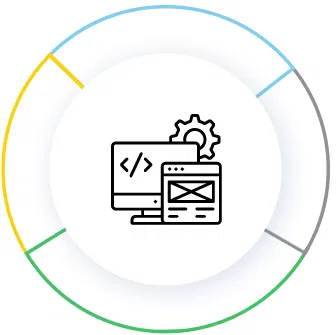Flutter app development company
Next-gen flutter app development services for unified, high-performance experiences
Request a free consultationOur Clients
Our Flutter developers deliver high-performance apps that ensure smooth user experience for every platform. Our proficient developers create visually great applications compiled for mobile, web, and desktop from one codebase. Whether it is for a start-up MVP or an enterprise-level solution, we make sure your application is fast, versatile, and optimized for success. Emphasizing on performance, design consistency, and rapid development, we help you launch high-quality apps quickly and cost-effectively according to your business needs.
From idea generation to feature prioritization, we help you with strategic guidance and expert advice. Get a clear, well-structured strategy that sets your app up for success while minimizing development risks and costs.
Our Flutter app development service is designed to ensure highly scalable and high-performance applications that run smoothly across platforms. Our developers use Flutter’s rich set of features to bring visually attractive yet highly functional apps to life.
We modernize your existing applications by migrating them to Flutter with our Flutter app migration service. We ensure smooth transition while keeping all the data, design, and functionality intact yet making the app better in terms of performance and maintainability.
Our developers are expert at building apps that can easily connect with an IoT ecosystem and offer control, monitoring, and data visualization capabilities through intuitive, mobile-friendly interfaces. We ensure that your app for IoT devices stays agile and scalable.
We can help you to seamlessly migrate to the latest version of Flutter for enhanced business continuity, security upgrades and better performance improvements.
We provide a variety of engagement models for support and maintenance services. These are designed to ensure application uptime while increasing the quality of your apps as well as reducing the number of errors.
Words that motivate us to go above and beyond! A glimpse of our customers who make us shine among the rest.

Elevate your business with custom Flutter app development services designed for seamless cross-platform performance. Our expert Flutter developers ensure that apps meet the unique business needs of your target market with fast, scalable, and attractive applications that promote engagement and growth.

Future-ready apps
Accelerated time-to-market
User-centric UI & UX
Exceptional features
Smart architecture
Smooth integration
Cross-platform capabilities
Less coding
Native performance
Improved scalability
Test-driven development
Quicker debugging

Softweb Solutions is a Flutter development company. We empower enterprises to build high-quality cross-platform apps that drive automation and optimize process management. Hire our experienced Flutter app developers to create enterprise-grade mobile apps that deliver lasting value. Here’s why collaborating with our trusted and highly skilled Flutter app developers ensures success:
Flutter facilitates the creation of high-performance, natively compiled apps for various platforms using a single codebase. It has become a preferred choice for developers and businesses because of its rich UI toolkit, fast development cycle with features like hot reload, and a growing community. Furthermore, it provides consistent design across platforms, reducing development time and costs. It also offers consistent design across these platforms for less time and reduced costs.
Flutter enables developers to build cross-platform mobile apps for both iOS and Android from a single codebase. We create natively compiled apps that provide high performance, smooth animations, and uniform user experience. Flutter helps in creating visually appealing and functional mobile apps quickly and efficiently with its customizable widgets and modern UI framework.
The cost of development depends upon the complexity of the app, features required, development period, and so forth. In general, Flutter provides a lot more cost benefits over native app development because you would be able to develop an app for a few platforms from one code base, thus saving quite some time and resources. For more details, write to us at info@softwebsolutions.com.
The distinctive aspect of Flutter is that it offers a fully integrated toolkit, which has the ability to compile the code down to native machine code and provides near-native performance. With rich sets of customizable widgets, and an independent rendering engine, Flutter enables developers to make consistent UIs across platforms. Hot reload accelerates the development and requires less bridging between platforms than in other frameworks, like React Native or Xamarin.
Flutter is appropriate for enterprise-level apps. Its ability to scale, high performance and capacity to handle complex features without creating the need for having multiple codebases make it ideal. Flutter can be easily integrated with backend systems, APIs, and databases. This makes it suitable for creating enterprise-grade solutions that require high efficiency along with user-friendly experiences throughout platforms.
Flutter supports the integration of native modules via platform channels. This allows Flutter apps to access native APIs or modules written in Java, Kotlin, Swift, or Objective-C so it can potentially use any device-specific feature or third-party libraries that are not available within Flutter itself.
Ready to build your cross-platform app?
Talk to our Flutter specialists now!